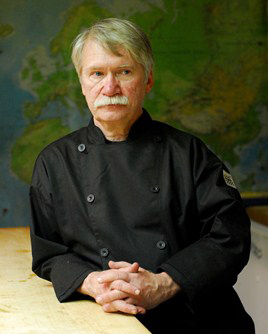Think Tank: The Degree that Never Ends
08 July 2015
 What can the graduate do for the school? Says Chef Sorgule, the proper question should be, What can the school do for the graduate?
What can the graduate do for the school? Says Chef Sorgule, the proper question should be, What can the school do for the graduate?
By Paul Sorgule, MS, AAC
Considering the ongoing questions about the value of a degree and the ever-changing landscape of the food business, I am constantly giving thought to how administrators of culinary programs can increase the perceived and real value of an education in food.
Everyone is certainly aware of the pressure pertaining to value being passed on to institutions from accrediting bodies, especially those preparing students for technical trades. The answer moving forward might very well be in shifting how we look at a degree.
For far too long, earning a college education was a two- or four-year process that students went through in pursuit of a degree. In other words, students passed through the college experience, incurring significant debt, with closure coming on graduation day.
The connections that continue to exist between the college and the graduate are limited to alumni newsletters, reunions and gift requests from the Institutional Advancement Office. We might invite an occasional graduate back to speak to a class or provide a demonstration, but, for the most part, the theme is: “What can the graduate do for the school, rather than what can the school do for the graduate.”
What if we viewed enrollment in a program as a lifelong partnership between the college and the student? Yes, the formal degree would have a date of completion, but why should the interplay and information sharing end at the same time?
Students become graduates, become members of alumni organizations, and if they feel so inclined, become ambassadors. This level of connection bears fantastic fruit as graduates remain in touch with the school, continue to grow while pursuing their careers, share information using the school as a portal, and sense the ongoing support and connection that the college provides as part of the educational partnership.
So, what does this ongoing support look like? With technology constantly improving, the ability to stream information to graduates can be seamless. Colleges could easily create a password-access webpage for graduates featuring short video clips on technique, sharing of lecture information from their favorite chef instructor, chat lines with other alumni, and access to solution experts who could walk them through problem-solving scenarios related to their jobs or businesses.
Placement services could expand to serve as employer-paid career representatives constantly connecting alumni with exciting career opportunities as they build their résumés. Short, stackable certification programs that might or might not include residences could be offered for a price to those who carry the honor of graduation from your college. These certifications could focus on those evolving skill requirements that will help graduates build a portfolio.
Most important is the feeling that graduation is only the beginning. The college becomes a partner in every graduate’s career—from that entry-level position to executive chef, food and beverage manager, general manager or owner/operator. If there is a need, the college is there to help. This is just part of the partnership, a critical piece of the value formula.
How does the college benefit? First, this partnership is a very attractive recruitment tool for admissions, a differentiated product that sets a school apart from those institutions that fail to see the value and seize the opportunity.
Second, these alumni/partners are even more likely to hire graduates and encourage new, potential students to select their college.
Finally, this seems to me to be a very ethical and beneficial approach toward justification of the growing expense of a college education.
We really do need to think differently about how we approach the education model. Food for thought.
Paul Sorgule, MS, AAC, president of Harvest America Ventures, a “mobile restaurant incubator” based in Saranac Lake, N.Y., is the former vice president of New England Culinary Institute and a former dean at Paul Smith’s College. Contact him at This email address is being protected from spambots. You need JavaScript enabled to view it., www.harvestamericaventures.com.
